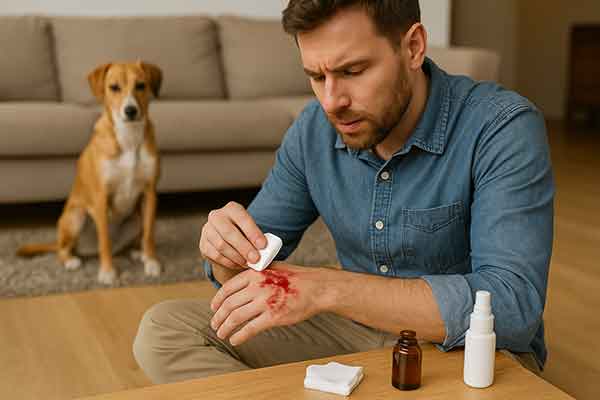What to Do If a Dog Bites You? | First Aid, Medical, and Legal Advice
A dog bite can happen when you least expect it—whether from an unfamiliar animal or even a dog you know. While many bites are minor, some can result in serious infections, nerve damage, or legal consequences. That’s why knowing what to do if a dog bites you is crucial for protecting your health and legal rights.
In this comprehensive guide, we’ll walk you through the essential steps to take immediately after a dog bite, when to seek medical attention, how to report the incident, and how to prevent future bites.
Table of Contents
- Immediate First Aid After a Dog Bite
- When to See a Doctor for a Dog Bite
- Risks of Infection and Disease
- How to Report a Dog Bite
- Legal Considerations After a Dog Bite
- Coping With the Emotional Impact
- How to Prevent Dog Bites
- FAQ
Immediate First Aid After a Dog Bite
Your first step is to clean the wound thoroughly. Even a small puncture can introduce bacteria deep into tissue.
Step-by-step first aid:
- Wash the wound: Use mild soap and warm water. Rinse for at least 5 minutes to flush out bacteria.
- Stop the bleeding: Apply gentle pressure with a clean cloth or sterile bandage.
- Apply antiseptic: Use hydrogen peroxide or iodine to disinfect the area.
- Cover the wound: Use sterile gauze or a bandage.
- Monitor for signs of infection: Redness, swelling, or pus should not be ignored.
Clean minor wounds carefully, but don’t hesitate to seek medical care if there’s any doubt.
When to See a Doctor for a Dog Bite
See a doctor if:
- The bite is deep, gaping, or bleeding heavily
- You haven’t had a tetanus shot in the last 5 years
- The bite is on your face, hands, or genitals
- There are signs of infection (heat, pus, spreading redness)
- The dog is unknown or may be unvaccinated
Your healthcare provider may prescribe:
- Antibiotics to prevent infection
- A tetanus booster
- Rabies post-exposure prophylaxis (PEP), if needed
Risks of Infection and Disease
Dog mouths carry bacteria such as Pasteurella, Staphylococcus, and Capnocytophaga. These can lead to infection, especially in people with weakened immune systems.
Serious concerns include:
- Rabies: Rare but fatal without prompt treatment. Always err on the side of caution.
- Tetanus: A bacterial infection from deep punctures; prevented by up-to-date vaccinations.
- Sepsis: Systemic infection that can develop from untreated bites.
Proper care and early intervention significantly reduce health risks.

How to Report a Dog Bite
Reporting a dog bite is important for public safety and legal documentation. Here’s how to proceed:
- Contact local animal control or health department
- Provide details: Location, time, description of the dog and the owner if known
- Submit medical records or incident reports if requested
Animal control may quarantine the dog to check for rabies or behavioral evaluation. Reporting also helps authorities track repeat offenders or dangerous pets.
Legal Considerations After a Dog Bite
Dog bite laws vary by state, but you may be entitled to compensation for:
- Medical expenses
- Lost wages
- Pain and suffering
- Psychological trauma
Liability depends on:
- If the owner was negligent or failed to restrain the dog
- State laws (strict liability vs. “one-bite” rule)
- Whether you provoked the dog
If you’re seriously injured, consult a personal injury attorney familiar with local dog bite laws.
Coping With the Emotional Impact
Dog bites can cause more than physical harm. Many victims report:
- Post-traumatic stress
- Fear of dogs or anxiety around animals
- Nightmares or flashbacks
Therapy or counseling can help you process the experience, especially if the attack was traumatic or involved a familiar dog.
How to Prevent Dog Bites
For dog owners:
- Properly socialize and train your dog
- Never leave children unattended with dogs
- Spay/neuter to reduce aggression
- Use leashes and secure fencing
For the public:
- Never approach an unfamiliar dog
- Ask the owner before petting
- Avoid sudden movements or staring
- Stand still if approached aggressively (“be a tree”)
Understanding canine body language—like growling, stiff posture, or raised hackles—can help you avoid triggering an attack.
FAQ
Should I go to the hospital after a dog bite?
Go to the ER if the wound is deep, bleeding uncontrollably, infected, or if the dog is unknown and could carry rabies.
Who pays for medical bills from a dog bite?
If the dog has an owner, their homeowner’s or renter’s insurance often covers medical costs. If not, you may need to pursue legal compensation.
What happens to the dog after a bite is reported?
Usually, the dog is quarantined for 10 days to observe for rabies. If the dog has a history of aggression, further action may be taken by authorities.
Can I get rabies from a dog bite?
Yes, but it’s rare in the U.S. if the dog is vaccinated. Still, always report the bite and consult a doctor to determine if rabies treatment is necessary.
What if a family dog bites me?
Even if it’s your own pet, clean the wound and see a doctor if needed. Evaluate what triggered the bite and consider professional training or behavioral evaluation.
Conclusion
Getting bitten by a dog can be alarming, painful, and potentially dangerous. Whether the wound is minor or severe, it’s important to act quickly. From cleaning the bite properly to seeking medical attention and reporting the incident, your response can make all the difference in your recovery and safety.
Understanding what to do if a dog bites you not only protects your health, but can also help prevent future incidents through education and awareness. Stay safe—and remember that responsible pet ownership and respectful behavior around dogs go a long way in preventing bites.





